AMD Zen 3 Ryzen Deep Dive Review: 5950X, 5900X, 5800X and 5600X Tested
by Dr. Ian Cutress on November 5, 2020 9:01 AM ESTCPU Tests: Synthetic
Most of the people in our industry have a love/hate relationship when it comes to synthetic tests. On the one hand, they’re often good for quick summaries of performance and are easy to use, but most of the time the tests aren’t related to any real software. Synthetic tests are often very good at burrowing down to a specific set of instructions and maximizing the performance out of those. Due to requests from a number of our readers, we have the following synthetic tests.
Linux OpenSSL Speed: SHA256
One of our readers reached out in early 2020 and stated that he was interested in looking at OpenSSL hashing rates in Linux. Luckily OpenSSL in Linux has a function called ‘speed’ that allows the user to determine how fast the system is for any given hashing algorithm, as well as signing and verifying messages.
OpenSSL offers a lot of algorithms to choose from, and based on a quick Twitter poll, we narrowed it down to the following:
- rsa2048 sign and rsa2048 verify
- sha256 at 8K block size
- md5 at 8K block size
For each of these tests, we run them in single thread and multithreaded mode. All the graphs are in our benchmark database, Bench, and we use the sha256 and md5 results in published reviews.
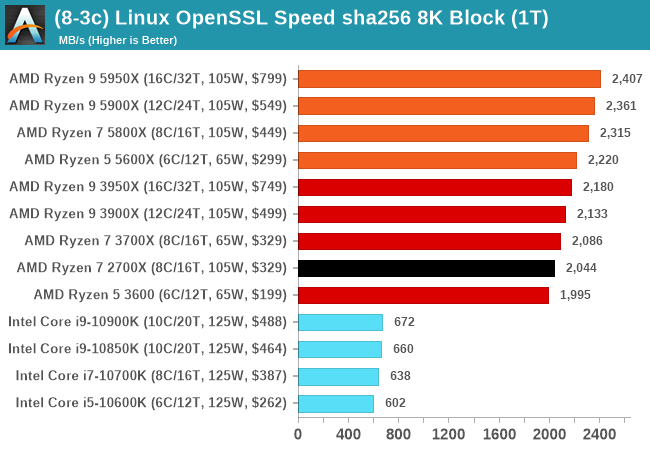
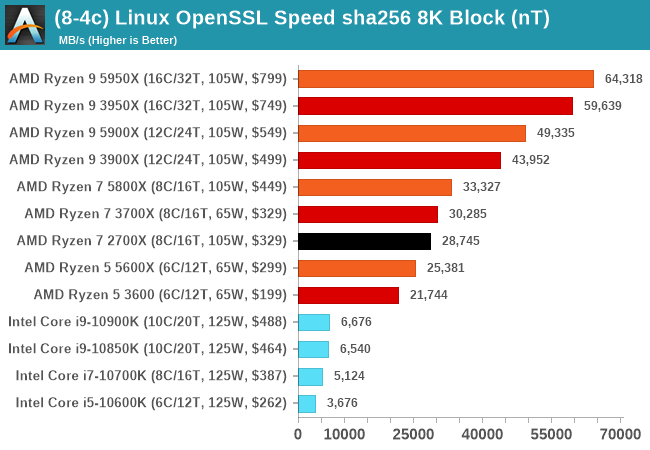
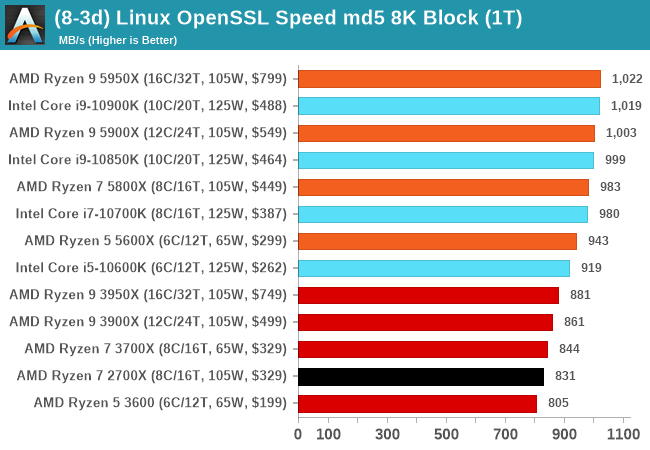
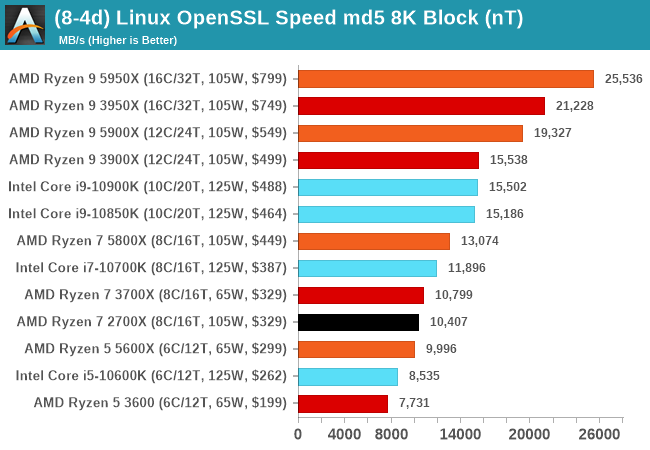
GeekBench 5: Link
As a common tool for cross-platform testing between mobile, PC, and Mac, GeekBench is an ultimate exercise in synthetic testing across a range of algorithms looking for peak throughput. Tests include encryption, compression, fast Fourier transform, memory operations, n-body physics, matrix operations, histogram manipulation, and HTML parsing.
I’m including this test due to popular demand, although the results do come across as overly synthetic, and a lot of users often put a lot of weight behind the test due to the fact that it is compiled across different platforms (although with different compilers).
We have both GB5 and GB4 results in our benchmark database. GB5 was introduced to our test suite after already having tested ~25 CPUs, and so the results are a little sporadic by comparison. These spots will be filled in when we retest any of the CPUs.
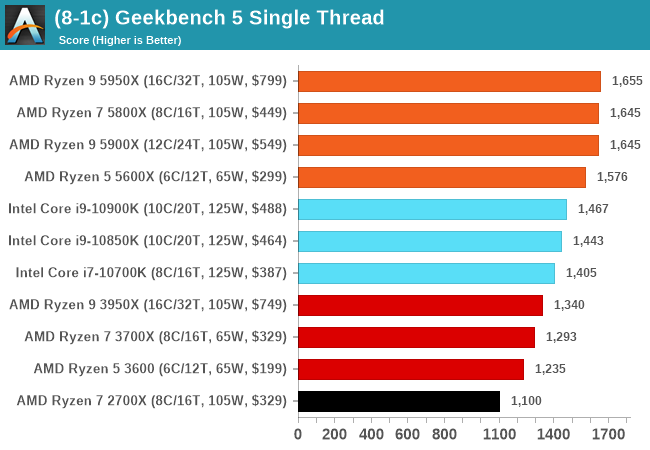
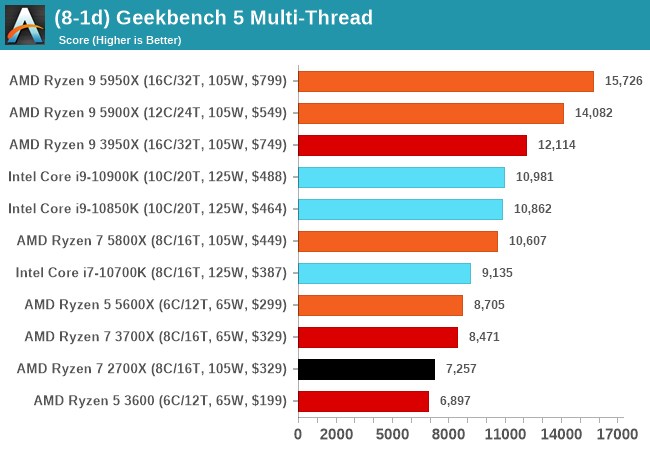










339 Comments
View All Comments
Jvanderlinde - Saturday, November 7, 2020 - link
Glad to read the 2700x is taken into account. The 5950X seems like a hell of an upgrade coming from that path. Gotta love AMD for what it's bin accomplishing in the last few years.Kallan007 - Saturday, November 7, 2020 - link
I just want to thank AMD for a lovely way to end 2020! I cannot wait for those AMD 6000 series card reviews! Good job as always AnandTech!Pumpkinhead - Saturday, November 7, 2020 - link
How is that possible that peak power for the 3700x having 8 cores is lower than for 3600 with 6 cores?nandnandnand - Saturday, November 7, 2020 - link
"Compared to other processors, for peak power, we report the highest loaded value observed from any of our benchmark tests."They selected the highest single wattage value from ANY of their tests. So at the same TDP, they should be very close to each other. I guess the point is to find the worst case scenario for each processor, rather than an average, to determine the power supply needed. Other reviews point to 3600 using less power on average:
https://www.tomshardware.com/reviews/amd-ryzen-5-3...
Pumpkinhead - Saturday, November 7, 2020 - link
>https://www.tomshardware.com/reviews/amd-ryzen-5-3...Interesting that 3700x being 1/3 faster in handbrake still draws only 13% more power, I always thought that in parallel workloads it power consumption scales linearly as you add more cores.
Even tho in AIDA stress test it draws 35% more power so peak consumption is different too, also look at the 5800x - draws almost twice as 5600x (also 6c vs 8c)
Kjella - Sunday, November 8, 2020 - link
It scales linearly until you hit the TDP, past that more cores lets you use a lower, more efficient frequency. As long as you can keep all cores loaded 8 cores on a 10W/core power budget will get less done than 16 cores at a 5W/core power budget even though 8*10 = 16*5. But with disabled cores you might have to run more of the chip, like the whole CCX to support 3 of 4 working cores. That will obviously be less efficient since the "overhead" has to be split by 3 instead of 4.Murilo - Saturday, November 7, 2020 - link
..and AMD price? ahahah.I want price!
psyclist80 - Saturday, November 7, 2020 - link
Im glad you guys added in Tiger Lake...very important data point. If it beat willow cove in its full implementation then its certainly going to beat the watered down 14nm version cypress cove and slay it on power efficiency.Im glad AMD has taken the crown back (last held 2003-2006)...as has been said in the past, the Empire will strike back...Hopefully Golden Cove can do that for Intel. That will face 5nm Zen 4 though...AMD looking strong for the next year or two!
Sushisamurai - Sunday, November 8, 2020 - link
apparently, looking at other reviews, there appears to be a performance uplift/downgrade (depends how you look at it) with the number of RAM sticks populated on the board (2 vs 4). I wonder how much of a difference it is with RAM speeds and memory stick population on the 5000 series.umano - Sunday, November 8, 2020 - link
I bought in june a 3800x and an x570 creator planning to upgrade to 5950x after zen 4 launches, but often, when we have more power, we find a way to crave for more. I work in fashion ph, for me the 35% bump in ps compared to my 3800x (bought because the price was the same as 3700) is a no brainer. It will also help me in capture one exports and zip compression. I did not think an upgrade so soon will benefit me so much, but you know life happens. Good job amd you made technology fun again